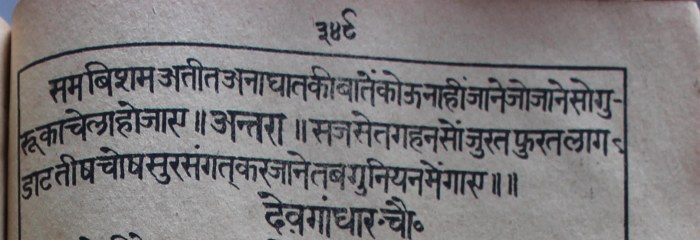Archive for the ‘Allabande Khan’ Category
Manuscripts of Rahim Fahimuddin Dagar
Ustad Rahim Fahimuddin Dagar had a considerable collection of hand written manuscripts of his ancestors – mostly of his grandfather Allabande Khan, his uncle Nasiruddin Khan and his father Rahimuddin Khan Dagar. After the untimely death of Nasiruddin Khan Dagar in 1936 the possession of these manuscripts had caused frictions in the family. I have discussed these writings in my book Dhrupad of the Dagars.
During my long apprenticeship as his disciple I would often see him leafing through them. I would try to use every such occasion to let my video camera range over pages that he opened and have in the process managed to record some fragments of the writings.
Rummaging through his papers one day he came across these loose sheets pinned together which he could not identify at first. A close examination revealed that they were prastara exercises for the Veena written by his uncle Nasiruddin Khan in 1912 in Alwar Rajasthan.
The video grabs above give us the title page with the author’s name and the first page. It should be possible to understand the logic or the algorithm if there is one from such fragments.
Here is a little video of him reading aloud the text of a Dhrupad composition from such a manuscript written by his grandfather Allabande Khan in 1908.
The second video shows the first page of the same manuscript and has him chiding me for wanting to know in a minute what supposedly take years to understand. If the names of the famous Dhrupad singers he reads aloud are of the authors of the compositions whose texts are written in the manuscript then it would be a very interesting one indeed.
For a long time the knowledge of the grammar and conceptual framework of Dhrupad was kept as privileged knowledge to be revealed only to a few chosen bearers of the tradition. Fahimuddin Dagar was enormously protective about his manuscripts, his enormous knowledge and insight. A part of this was of course due to the concern that the knowledge should be given through the right process to someone who would be able to carry the tradition forward
I would often bring him texts of Dhrupad compositions I found in rare books in the hope that he might remember some and spontaneously sing them. Here is his singing of the first part of a composition in Deosakh when he found a variant of its text in the Urdu version of Nad Vinod Granth (which is why I cannot read it). I try to coax him to sing the second part – he reads the text aloud but is unwilling to sing it or cannot remember the melody immediately.
Here is the same composition text from the Hindi version of Nad Vinod. Some kind of a reconstruction of the 2nd part – the antara based on the structure of the 1st part sung by him in this video would be possible for a singer who knows the Raga well. However it would not be as straightforward as reconstructing the 3rd and 4th parts – the sanchari and abhog from the 1st and 2nd as outlined in a previous post.
Perhaps the most interesting manuscript in his possession was what appeared to be an entire book on music written by his grandfather Allabande Khan in 1890. I saw a few pages of it – it has diagrams and tables and is probably on concepts of music. He can be seen reading from it in the beginning of my documentary film on Dhrupad.
I don’t know if all the manuscripts in the possession of Rahim Fahimuddin Dagar would ever become publicly accessible to be used by students and researchers of Dhrupad. The same sad story has been repeated often enough – of manuscripts in the zealously guarded possession of families in the end getting lost or destroyed – like the manuscript of Budhprakash of Seni compositions or the one of Radheshyamji of Tikamgarh. I hope this won’t happen with the manuscripts of the Dagar tradition that Fahimuddin Dagar had.
All articles on this blog © Ashish Sankrityayan. No part may be used except with written permission and explicit acknowledgement.




